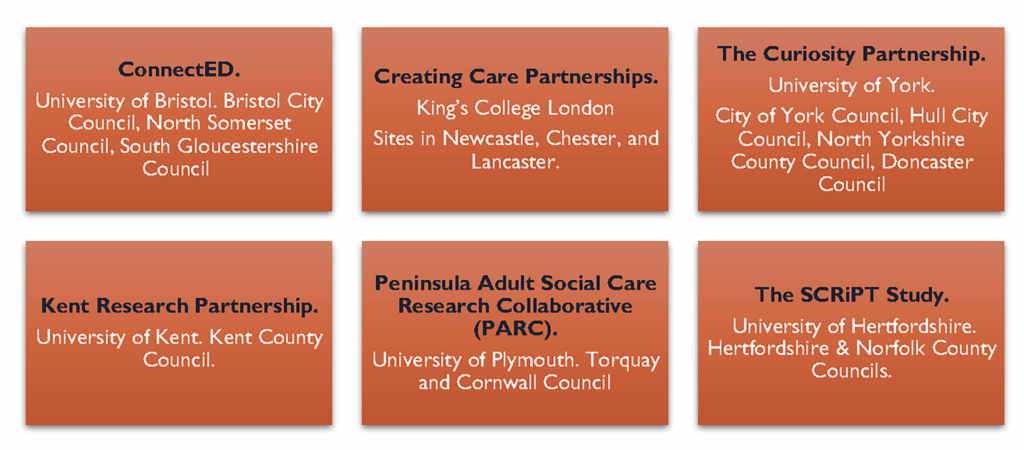Too often in the past, research and practice have been seen as two separate worlds – when in reality they should be two sides of the same coin.
This was a key message from a recent workshop held by Social Care Wales in conjunction with IMPACT and the National Institute for Health and Care Research (NIHR).
It built on insights from six ‘Social Care Research Partnerships’ funded by NIHR to develop deeper relationships between University researchers and Council/service partners. IMPACT has been part of the advisory boards of two of these, as well as sitting on the group that looks across all six partnerships to help identify key lessons (and chairing the advisory group of the new NIHR adult social care workforce research partnership that has been commissioned more recently).

These are carrying out various capacity building activities, such as appointing ‘researchers in residence’, facilitating communities of practice, providing training and helping to set out research priorities/develop research strategies. Similar work has also taken place in the West Midlands via the regional branch of ADASS and its practice-based research champions, and all these insights have helped to inform the work that IMPACT is doing in Derbyshire to help the local authority continue to build more of a (participatory) research culture. We’re also proud to be a trustee of the Social Worker of the Year Awards (in England) and to have helped them design and roll out a new national award (kindly sponsored by NIHR) to celebrate the contribution of practitioner-researchers.
Research Partnerships Workshops
Against this background, we were delighted to be part of one of the latest workshops from the Research Partnerships, which focused in more detail on practitioner-research, capacity building and promoting equality, diversity and inclusion. After an introduction to the six partnerships – and before a series of small group discussions led by each of the projects – IMPACT’s Jon Glasby was interviewed by Social Care Wales’ Abyd Quinn alongside Disability Assist’s Sophie Fournel. This focused on some of the barriers to supporting the careers of people undertaking practitioner-research (as well as people with lived experience conducting participatory research), and ways to create a more level playing field. In particular, Jon shared some of the work that IMPACT has been doing to build capacity and skills in the social care workforce, and to try to find innovative ways to overcome longstanding barriers.
Three examples are:
- Designing and championing roles that cut across traditional research, policy and practice, that are available as secondments from practice as well as through direct employment, and that build in as much flexibility as possible to help find the right people for the role. To take a seemingly minor issue, if a job description says that a postgraduate qualification is essential, then it automatically rules out a large group of people. If it says that you need a postgraduate qualification and/or equivalent experience from policy, practice or lived experience, then the role is immediately open to a broader range of people. This can be difficult to achieve in practice, as many job descriptions are based on longstanding templates negotiated between several parties and have to be benchmarked against other comparable roles to make sure they are fair and comply with all the relevant legislation and ethical requirements – so it can take considerable time and resilience to argue for a bespoke approach and navigate the complexities of agreeing changes. However, such time is (in our view) well spent.
- All our panels include a mix of lived experience, practice knowledge and research (as well as panel members with a range of different protected characteristics wherever possible) to try to avoid the danger of group think or of in-groups replicating themselves. To be successful, people have to work with a range of different people who might all be looking for different things – but this just mirrors the nature of many of our roles if people were offered the job.
- In our delivery roles, we use the Rooney rule wherever possible (where at least one person from a black and minority ethnic community who meets the essential criteria is shortlisted for every role). This has faced some push back from automated systems and from some HR colleagues in some institutions concerned at the balance to be struck between removing barriers and trying to take more positive action – but it seems to have made a difference to who applies, the conversations we have and the make-up of our team. This is contested but felt important to try – when one HR department argued that it wasn’t necessary because it might not achieve anything in practice, for example, we had to push back to say that if it didn’t really make any difference, then how could they object to us giving it a go?
These are just small examples and, in and of themselves, might not amount to much, given the nature of the barriers to be overcome. However, they all involve designing roles and processes well, trying to put stated values into action, challenging traditional assumptions and power imbalances, and using ‘organisational nouse’ to get new ways of working taken up by broader, often automated, large scale HR systems. As IMPACT continues its work we’ll learn more about how to do all these things, and the outcomes it can help achieve – but we’re grateful to NIHR, to Social Care Wales and to the research partnerships for letting us reflect on and share these challenges and possible ways forward together.
